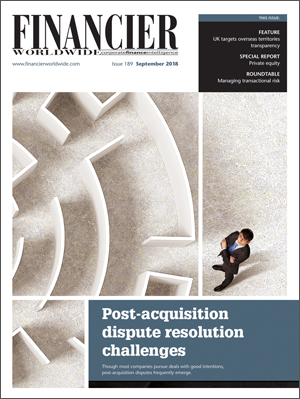Brazilian PE favourable despite election uncertainty
September 2018 | SPECIAL REPORT: PRIVATE EQUITY
Financier Worldwide Magazine
Brazil’s private equity (PE) industry had a very positive year in 2017, and began 2018 with more positive news around capital raises and deal activity. The challenge ahead is to maintain the 2017 deal activity in the second half of 2018, during the election period. No doubt there are promising opportunities in a market that is becoming more and more sophisticated in terms of deal structures, funding strategies and exit scenarios.
2017 year-end results of PE activity in Brazil were extremely promising. The volume of PE transactions was stable but the value transacted reached over BRL20bn, 44 percent more than 2016, according to the Transaction Track Record (TTR). The beginning of the year also pointed towards a very positive outlook in terms of macroeconomic aspects – Brazil with an estimated GDP growth of around 2 percent. It is important to note that in spite of a relative optimism, there has been concern over political stability, the Brazilian fiscal deficit and the continuing need for reforms in the country, such as pension, tax, labour and political.
The first half of 2018 presented modest figures in terms of activity delivered by the PE industry, with a lower number of transactions compared to 2017, both in terms of volume and value. Despite this, market sources still believe in a strong pipeline of transactions. In terms of sector preferences, distribution, retail and health continue to be the preferred targets for investment according to the TTR. The growing number of PE deals in transportation, logistics and other parts of the infrastructure sector is also notable.
By the same token, managers have been able to attract a lot of capital from investors despite the challenges posed by political turmoil involving Brazil and other Latin American countries, including the historic corruption scandal revealed by Operation Car Wash. It is expected that around $3.5bn will be raised by managers like Pátria, Vinci, Bozano, Stratus and others during 2018, which represents the highest volume since 2014. Such amounts do not include capital raised by global PE titans operating in Brazil, including Advent, Carlyle, Apollo, Silver Lake and others.
This is all the more favourable and remarkable considering it is election year in Brazil. Although the effect of the election may not been felt in the first half of 2018, the fact is that Brazilian currency fluctuations and the relative instability of capital markets over the period are evidence of a challenging scenario that has not yet impacted PE activity. We can speculate as to the reasons for promising opportunities in the PE market in the face of adverse conditions. We find that short-term economic downturns seem to have little effect on the strength of the PE industry, such as a favourable performance by higher-end managers, relatively low pricing averages and a strong and resilient internal market for certain industries. According to 2018 research carried out by Private Equity Bay, the performance of PE firms demonstrates a large disparity, which can be as high as 5000 basis points in Brazilian currency, delivered at higher than 20 percent per annum in recent years. The same study also reveals that Brazil presented in 2017 an average medium multiple per transaction of 7.3, whereas such multiple is above 10 in other markets.
The PE industry is becoming more sophisticated in terms of deal structures, funding strategies and exit scenarios. In addition, the leverage ratios of PE-invested companies in the Brazilian market are low, which can be explained by historically high interest rates and what we would call a very ‘young industry’. In day-to-day transactions, we are seeing a significant modification in deal structures. Twenty years ago, PE deals would tend to be strategic investments in the Brazilian market. In the 2000s, PE firms introduced more partner alignment strategies for transactions, mostly represented by variations of stock options and earn-out formulas. PE firms have also been taking the form of a PE investment fund (Fundo de Investimento em Participações (FIP)). The FIP is organised and exists pursuant to the rules of the Brazilian Securities and Exchange Commission (Comissão de Valores Mobiliários (CVM)).
An FIP is authorised to invest in stocks, debentures, warrants and other securities that are mostly convertible into stocks of publicly or closely held corporations, where the FIP actually participates in the invested company’s decision-making process. The FIP is commonly used due to its tax advantages. However, in the past year, Brazilian tax authorities have been trying to restrict such advantages. In the last few years, deal funding has been modified and seller financing has been widely used by PE firms as a means of adding some level of leverage to their transactions. A few large deals have also included third-party financing. Finally, exit scenarios are also becoming stronger locally. For example, even in a very tough year like 2017, 10 IPOs and 16 follow-ons were implemented at the Brazilian Stock Exchange.
All of these elements are converging to make for a very interesting time for dealmaking in Brazil. Of course, if one expects higher returns due to acquisitions made during an election period with potential political instability, one might also expect greater risks. However, the continued improvement in PE dealmaking is unlikely to be affected, regardless of the election results. On the contrary, depending on the winning candidate, there is a potential for some of the expected reforms to be implemented, which may result in even greater yields and a sustainable basis for another growth cycle.
Jose Setti Diaz is a partner at Demarest Advogados. He can be contacted on +55 (11) 3356 1549 or by email: jdiaz@demarest.com.br.
© Financier Worldwide
BY
Jose Setti Diaz
Demarest Advogados


